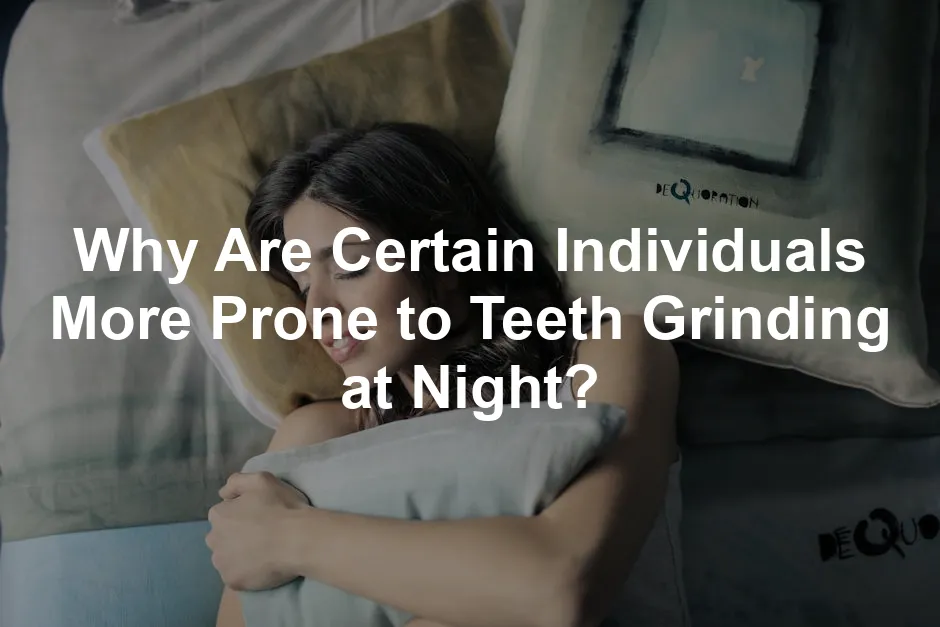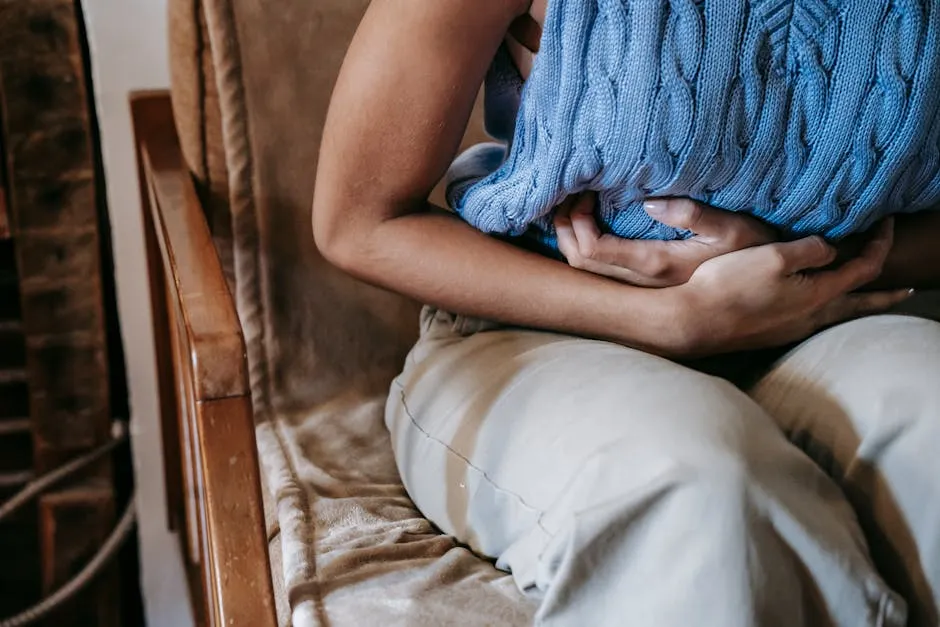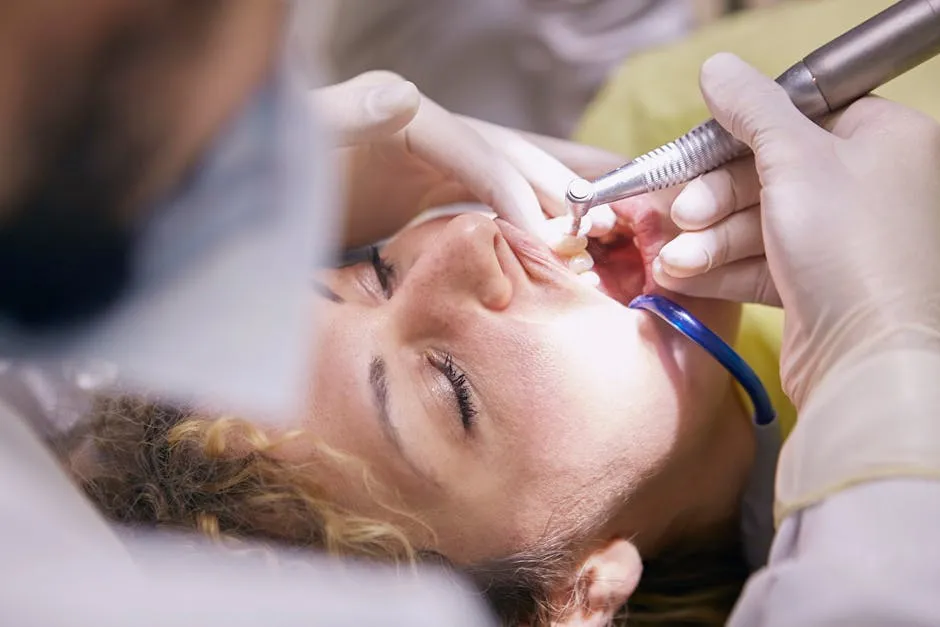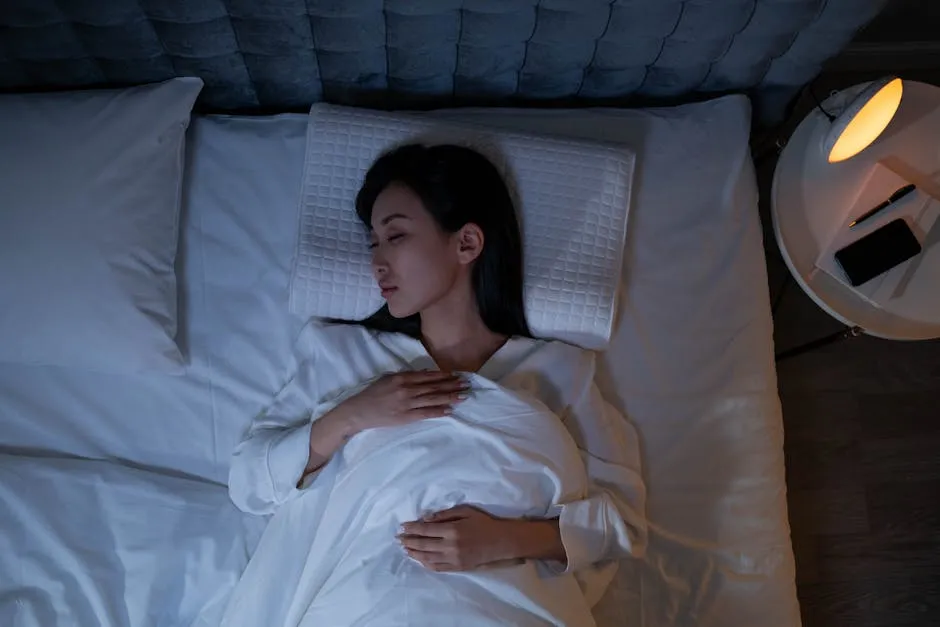
Why Are Certain Individuals More Prone to Teeth Grinding at Night?
Introduction
Teeth grinding, also known as bruxism, is a sneaky villain lurking in our sleep. You might think you’re having a peaceful night, only to wake up with a sore jaw or a headache. Surprise! Your teeth have been putting on a grinding performance while you snooze. But why do some folks find themselves in this dental drama more often than others?
The reasons behind nighttime teeth grinding are as varied as the characters in a sitcom. Stress is a major culprit. Imagine this: after a long day of work, you finally hit the pillow, but your mind is still racing. That’s like inviting bruxism to the party! But stress isn’t the only player in this game. Genetics also have their say. If your family tree has a history of teeth grinding, you might find yourself joining the ranks.
Lifestyle factors can also contribute to this nocturnal nuisance. Heavy caffeine consumption or a penchant for late-night cocktails can amp up the likelihood of bruxism. Add in the occasional late-night Netflix binge, and you’ve got a recipe for a grinding extravaganza.

Moreover, sleep disorders such as sleep apnea may also have a hand in the teeth-grinding game. Think of your body as a well-orchestrated symphony; when one section falls out of sync, it can lead to chaos!
So, buckle up! In this article, we’ll tackle the underlying causes of nighttime teeth grinding. By the end, you’ll have a better understanding of why some people are more prone to this pesky condition—spoiler alert: it’s not just about bad dental hygiene! From stress to genetics, we’ll uncover the mysteries behind bruxism. Are you ready to explore the whys and hows? Let’s dive in!
Causes of Teeth Grinding
Understanding why certain individuals are more prone to teeth grinding at night requires a closer look at several contributing factors. It’s a multifaceted issue, with psychological, genetic, lifestyle, medical, and even demographic influences coming into play. Let’s break it down!
Psychological Factors
Stress and Anxiety
Stress and anxiety often take center stage in the bruxism theater. Picture this: after a long day, you finally lay down to rest, but your brain won’t stop scrolling through your to-do list or replaying that awkward moment from two weeks ago. This mental chatter can trigger teeth grinding. Studies show that heightened anxiety levels correlate with increased bruxism episodes. When the mind races, the jaw tends to follow suit, clenching and grinding away, often without the individual realizing it. So next time you’re feeling overwhelmed, remember that your teeth might be putting on a late-night performance, too!

To help combat this, consider indulging in some relaxation with a Stress Relief Coloring Book. This fun activity can help soothe your mind and reduce anxiety levels, giving your jaw a much-needed break.
Understanding the impact of stress can be crucial. why do we feel stressed in modern society
Personality Traits
Interestingly, personality traits can also influence the likelihood of grinding teeth at night. Individuals who are aggressive, competitive, or hyperactive may find themselves more susceptible to this habit. Think of it as a kind of personality clash; aggressive types might channel their inner warriors, even in sleep. Research points out that those with a type A personality—often described as driven and ambitious—are more likely to experience bruxism than their laid-back counterparts. So, if you’ve ever been described as “intense,” it might be time to check in with your molars!

To help manage that intensity, consider using a Meditation Cushion. This comfy seat can provide a perfect spot to practice mindfulness and calm your racing thoughts before bedtime.
Genetic Factors
Genetics plays a surprising role in teeth grinding tendencies. If you have family members who grind their teeth, you might just be following in their footsteps. Studies indicate a familial predisposition to bruxism, suggesting that this condition can indeed run in families. For instance, research involving twins has shown that the likelihood of developing bruxism is significantly higher among those with a sibling or parent who also grinds their teeth. It seems that sometimes, the apple doesn’t fall far from the tree—especially if that tree has a few bruxists in its branches!

Genetic factors can have a significant impact on various conditions. why do genetic factors influence wrinkle development and prevention
Lifestyle Influences
Substance Use
Your lifestyle choices can also affect your chances of becoming a nighttime grinder. Heavy caffeine consumption? Check. Frequent alcohol use? Double check. Smoking? You guessed it! These habits can increase the likelihood of bruxism. Caffeine is a stimulant that can exacerbate anxiety and lead to a restless night, while alcohol can disrupt sleep patterns and lead to increased grinding. And let’s not forget about smoking, which can also contribute to teeth grinding. If you enjoy a late-night cup of joe or a cocktail, you might want to reconsider your evening routine.

Instead of that evening espresso, why not switch to a soothing Herbal Tea Assortment? This delightful collection can help you unwind and promote relaxation, making it a perfect addition to your nighttime routine.
Sleep Disorders
Sleep disorders, particularly sleep apnea, have a strong correlation with bruxism. When breathing is interrupted during sleep, the body often responds in various ways. One such response can be teeth grinding. Individuals with sleep apnea may not even realize they’re grinding their teeth as they struggle to get restful sleep. It’s like your body decides to take on additional stress while you’re already trying to catch some Z’s. Addressing sleep disorders can significantly alleviate bruxism symptoms, allowing for a more peaceful night and a happier mouth!

Understanding sleep disorders can help in managing bruxism. why do environmental factors influence sleep disorders like bruxism
Other Medical Conditions
Bruxism isn’t an isolated issue; it often coexists with other medical conditions. Gastroesophageal reflux disease (GERD) is known to be linked with teeth grinding, as the discomfort from acid reflux can lead to muscle tension and involuntary clenching. Additionally, temporomandibular disorders (TMD) can contribute to bruxism. Neurological disorders, such as Parkinson’s disease, may also involve grinding as a symptom. If you have one of these conditions, it’s essential to address them, as they could be the underlying cause of your nocturnal teeth grinding.

If you find yourself struggling with jaw tension, a Jaw Exerciser can help strengthen and relax your jaw muscles, providing relief from the tension that may contribute to bruxism.
Age and Gender
Age plays a significant role in the prevalence of bruxism. Children and adolescents often experience this condition more frequently than adults. In fact, up to 50% of children may grind their teeth at night, typically outgrowing the habit as they mature. Adults, however, see a decline in bruxism prevalence as they age, with only about 3% of older adults reporting the habit. Gender differences also exist; studies show that while awake bruxism is more common in women, sleep bruxism affects both genders equally. So, whether you’re young or old, it seems everyone can find themselves tangled in the bruxism web!
Understanding these factors sheds light on the complex reasons behind nighttime teeth grinding. By identifying these contributing elements, individuals can take steps to address their unique situations, seeking help when needed and finding relief from the clenching and grinding that disrupts their nights.

Consequences of Teeth Grinding
Teeth grinding, or bruxism, can lead to a range of uncomfortable consequences. Let’s break it down into short-term and long-term effects.
In the short term, muscle fatigue is common. Your jaw muscles work overtime, leading to soreness and discomfort. You might wake up feeling like you’ve just completed a heavy workout—without the benefit of a personal trainer! Headaches are also frequent companions of bruxism. Those dull throbbers can be relentless, often starting at the temples and spreading throughout the head. It’s like your teeth and jaw have decided to throw a party, and you’re the one cleaning up the mess.
Long-term effects can be much more serious. Repeated grinding leads to significant tooth wear. Imagine your favorite shoes after years of wear; now picture that happening to your teeth! The enamel that protects them becomes thin, exposing sensitive layers underneath. This can result in increased tooth sensitivity, making ice cream a potential nightmare.

Moreover, teeth grinding can contribute to temporomandibular joint (TMJ) disorders. The TMJ is the hinge connecting your jaw to your skull, and when overworked, it can cause pain and restrict movement. You might feel like a character from a slapstick comedy, unable to chew without discomfort. This can lead to chronic pain and difficulties when trying to enjoy a simple meal.
Dental damage is another significant consequence. Chipped or cracked teeth become a reality for many who grind their teeth at night. In severe cases, this could lead to the loss of teeth, requiring costly dental procedures to repair the damage. The price of fixing a smile can be steep, both financially and emotionally.
In summary, while a little teeth grinding might seem harmless, the short-term pain and long-term consequences can have a significant impact on your quality of life. If you suspect that you or a loved one may be grinding their teeth at night, it’s time to take action before things get out of hand.
Diagnosis and Treatment Options
Diagnosis
Diagnosing bruxism typically begins during a dental exam. Dentists look for signs of wear and tear on teeth, such as flattened surfaces or cracks. They also check for tight jaw muscles and any discomfort around the jaw joint. Patient history is crucial—dentists will ask about symptoms like headaches, jaw pain, and any noticeable grinding sounds during sleep. In some cases, a sleep study may be recommended to observe nighttime grinding.

Treatment Strategies
Preventive measures are often the first line of defense against bruxism. Stress management techniques can be incredibly helpful. Consider mindfulness practices, yoga, or even good old-fashioned deep breathing. Lifestyle changes, like reducing caffeine and alcohol intake, can also make a difference. You might find that swapping your evening espresso for herbal tea does wonders for your jaw!
Dental solutions include mouth guards or splints, which are custom-fitted devices worn during sleep. These handy tools act as a buffer between your teeth, absorbing the grinding pressure and protecting enamel from wear. It’s like giving your teeth a cozy blanket to snuggle under at night.

If the bruxism persists, medical interventions may be necessary. Certain medications can help reduce muscle activity associated with grinding. For those looking for a more advanced option, Botox injections have been shown to alleviate bruxism symptoms by paralyzing the jaw muscles temporarily. This treatment, however, is typically reserved for severe cases and requires regular appointments for maintenance.
In conclusion, diagnosing and treating bruxism involves a combination of dental evaluations, lifestyle changes, and potentially medical interventions. By addressing the root causes and symptoms, individuals can find relief and protect their precious pearly whites from further damage.
FAQs
Is bruxism hereditary?
Yes, bruxism can indeed run in families. Studies suggest a genetic predisposition to teeth grinding. If a parent or sibling grinds their teeth, your chances of doing the same may increase. A study indicated that about 37% of people with sleep bruxism had a first-degree relative who also experienced the condition. This familial link points to a combination of genetics and environmental factors contributing to bruxism.
Can stress really cause teeth grinding?
Absolutely! Stress and anxiety are significant contributors to bruxism. When life gets overwhelming, your jaw may unconsciously engage in grinding or clenching. This often occurs at night, reflecting the mental strain you might not even realize you’re holding onto during the day. Addressing stress through relaxation techniques, exercise, or therapy can effectively reduce bruxism episodes.
Are there any home remedies for bruxism?
Yes, several natural remedies and lifestyle adjustments can help manage bruxism. Techniques such as warm compresses on the jaw, practicing mindfulness or meditation, and maintaining a regular sleep schedule can be beneficial. Reducing caffeine and alcohol intake, especially before bedtime, may also lessen grinding episodes. Keeping your jaw relaxed during the day can help, too!
Can children grind their teeth?
Indeed, bruxism is common in children, particularly during the emergence of baby and permanent teeth. It can be triggered by stress, misaligned teeth, or even normal dental development. While many children outgrow this habit, it’s essential for parents to monitor for signs of tooth wear or discomfort. Regular dental check-ups can help address any concerns early.
What should I do if I suspect I have bruxism?
If you suspect you have bruxism, it’s wise to consult with a dental professional. They can conduct an evaluation, checking for signs of wear on your teeth and assessing your jaw’s health. They may recommend a custom mouth guard for nighttime use, stress reduction techniques, or other treatment options based on your specific situation. Taking action now can help protect your dental health in the long run!
Conclusion
Understanding the various factors that contribute to teeth grinding is crucial for effective management and treatment. While it may be easy to dismiss bruxism as just another annoying habit, the potential consequences on dental health are significant. Not only can it lead to tooth wear, but it can also cause jaw pain, headaches, and even temporomandibular joint (TMJ) disorders.
Recognizing the signs of bruxism is the first step toward addressing the issue. If you wake up with a sore jaw or notice unusual wear on your teeth, don’t brush it off! Seeking appropriate interventions can help alleviate this nocturnal nuisance. Options such as stress management techniques, lifestyle changes, and dental solutions like custom mouthguards can make a world of difference.
Moreover, understanding the psychological, genetic, and lifestyle factors at play can empower individuals to take control of their dental health. Stress management, for instance, may not only improve your sleep quality but also reduce the grinding episodes. So, if you suspect that bruxism is affecting your life, don’t hesitate to consult with a dental professional. Protect your smile today, and ensure that your teeth remain a source of confidence for years to come!

Additionally, investing in a Comfortable Sleep Mask can help create a more conducive sleep environment, blocking out distractions and allowing you to drift off peacefully.
Please let us know what you think about our content by leaving a comment down below!
Thank you for reading till here 🙂
All images from Pexels




